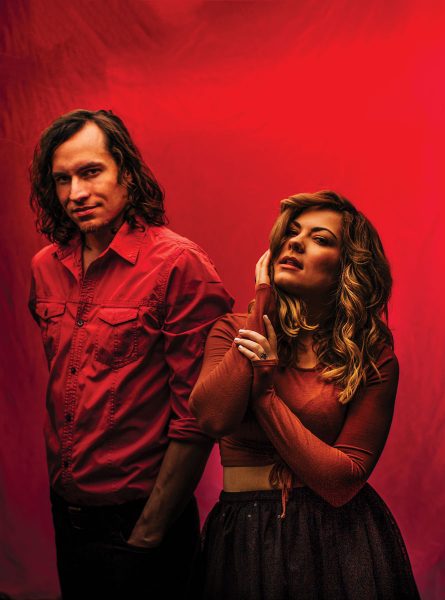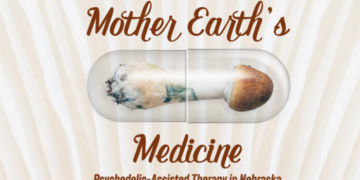For years, Chelsea Balzer and Matt Walker ran in the same circles, but somehow didn’t cross paths until Balzer joined the art performance group aetherplough in 2010 and was suddenly thrust into a musical relationship with Walker. Their undeniable compatibility was too much to ignore, and the duo soon formed their own outfit—Vital Organs—a band that fosters Walker’s unquenchable thirst for bold melodies and cinematic qualities, but is danceable at the same time.
“Back in the day, I was exclusively into hard rock music,” Walker says. “In recent years, I had been dying to write something that made me want to dance.”
Balzer, on the other hand, gravitated toward country artists like Reba McEntire and early LeAnn Rimes because of her father, a loyal country music fan.
“I would perform for our neighbors and their friends, which I think helped me develop that frontwoman identity from early on,” Balzer says. “But once I hit middle school, I was pretty into Alanis Morissette and Fiona Apple, and then soon after I got into stuff like Nine Inch Nails, P.J. Harvey, and The Cure. I’ve always loved vocalists who are brave and provocative—from Christina Aguilera to Zach de la Rocha.”
Fortunately, Vital Organs isn’t their first endeavor, as aetherplough thoroughly prepared them for what they would do in the future. The collective was built on collaborative creativity and taught them how to compromise.
“It always felt a little like we had no idea what we were doing at the beginning of a project,” Walker says. “As more people threw in their ideas and questions, it would start to take on a life of its own, and suddenly you’re rehearsing a full piece that you all helped bring into being. It was magical.
“I would say our whole philosophy for creating and collaborating is informed by that experience,” he continues. “aetherplough taught us to say, ‘Yes,’ to go all in, to be flexible, and also to listen to each other in a dasdrtist, and I’m so grateful to have been encouraged to play and explore in that community.”
“I personally feel that it taught me to think of all art and performance as ritual that has the power to change its players,” Balzer adds.
Officially established in 2015, Vital Organs dove right in and pulled from Omaha’s rich musical community, including Make Believe Recordings’ CEO/engineer Rick Carson. The Grammy Award-nominated producer worked on the group’s debut album, The Hysterical Hunger, a decision they didn’t hesitate to make once they fully realized Carson’s “rare combination of expertise, intuition, and top-notch gear.” The album itself gave Balzer and Walker opportunities to explore feminist ideals and the theme of honoring inner desires.
“We were both going through some real loss, and we needed to rediscover some kind of inner guidance toward true north,” Balzer explains. “For us, that feels like a hunger. We liked the idea of reclaiming the word ‘hysteria,’ which has previously been used as a weapon against women and as a form of gaslighting, but ultimately implies that emotion itself is untrustworthy and that giving yourself over to an experience is dangerous and even insane. We feel that this message is really prevalent in society today and continues to cause harm. We wanted the album to be a way of proclaiming to ourselves and others that we are taking the leap and giving in to that hunger.”
Drawn to synthesizers and soaring melodies, Vital Organs is actively honing in on its distinctive sound. However, they’re admittedly still trying to figure out how to navigate the rough waters as an indie band.
“It’s a lot of work and also a lot of head-scratching,” Walker says. “We have been both discouraged and really honored by the process of getting our work ‘out there.’ Some aspects of it are much harder than we anticipated, and yet there are these people who seem to appear from thin air and develop this relationship with your music, and really want to help you succeed. That has been a beautiful experience.”
Vital Organs plans on hitting the road this summer, despite Balzer being in grad school in Boston and Walker busy working at Omaha Children’s Museum. They managed to carve out a few weeks to play some new cities and share the bill with other bands.
“We know that the music will always mean something different to us than it means to others,” Walker says. “Every song reflects a time in our lives and a message we felt we needed to express. At the same time, we hear the songs and sort of forget that we wrote them. There is a kind of energetic release that comes from finishing songs and letting them exist in the world. It feels simultaneously intimate and mysterious.”
This article was printed in the May/June 2017 edition of Encounter.
 r
r












